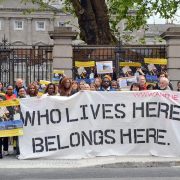RECENT DEVELOPMENTS ON CITIZENSHIP FOR CHILDREN BORN IN IRELAND
Until 2004, citizenship in Ireland was acquired purely by being born in Ireland, or “jus soli”. In 2004 a referendum was held an passed which meant that citizenship could only acquired for a child born in Ireland if one or more if their parents was a citizen of Ireland or had lawful residence for a certain period, otherwise known as “jus sanguinis”. This referendum came in the wake of the case L.O. v Minister for Justice, in which it was held that the Minister for Justice had the power to deport the parents of Irish citizen children where there are “grave and substantial reasons associated with the common good to do so”.
Recent high profile cases of children who have been born in Ireland, or who have lived most of their lives in Ireland, being issued with deportation orders have raised new concerns over the result of the 2004 referendum. The case of Eric Zhi Ying Mei Xue gave rise to massive outcry within both his community and around the country- Eric had been born in Ireland to a Chinese national mother, and a deportation order was issued proposing to return him to a country where he had never lived. Similarly, in the case of P.O. v Minister for Justice, a deportation was issued against a nine year old boy who had been born in Ireland, who tragically passed away as a result of sickle cell anaemia during the appeal of his case to the Supreme Court.
These cases likely represent a small fraction of the children born in Ireland who have been issued with deportation orders since the 2004 amendment and subsequent legislation. Department of Justice figures show that since 2013 approximately 134 children under the age of 18 have been deported from Ireland. At present within the department there are 285 minors who have live deportation orders against them. From these figures it is unclear how many of these children were born in Ireland, or who have spent most of their lives in Ireland.
As a result of cases like the boy in PO and Eric Zhi Ying Mei, there has been considerable public disagreement with the current regime. A recent Irish Times opinion poll has indicated that up to 71% of respondents to their survey are in favour of birth right citizenship. This is a stark change from the referendum result in 2004, in which 79% of voters agreed with the removal of birth right citizenship. Campaigns for the removal of the amendment or the introduction of amending legislation have been proposed, with the Labour party putting forward a bill which proposed to provide citizenship rights to children of non-national parents if they are born in Ireland and have lived in the State for more than three years. The bill was decried as “bad law” by the Minister for Justice Charlie Flanagan, but it appears that this bill is reflective of a changed view by the Irish public in birth right citizenship. The bill was rejected by government, but with the shifting public opinion it remains to be seen if the government will consider any legislative changes of their own.



